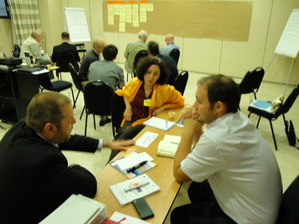
This summer in Romania I witnessed that developing strategy does not have to be the long, arduous and abstract process that we are used to. It can be done so much quicker when the principles of constructive dialogue are applied.
West Region in Romania, like other regions, is up for a new programming period 2014-2020 for the EU Regional Policy. What will they do when 700 mln. EUR will becomes available?.
West Region in Romania, bordering with Hungary and Serbia with Timisoara as main city, experiences that the top-down model of the Ceausescu period does not work anymore. Policy and budgets for public services are decided upon by central ministries in the capital Bucharest, but they need to get attuned to local needs for maximum impact.
“This time, we will do it our way ” said the people of Regional Development Agency West, (http://www.adrvest.ro/) the organisation that coordinates the making of the Regional Development Plan. So they organised sessions with the parties involved in the sectors of Health, Education, Business Support and Rural Development. People from the field - hospital directors, physicians, civil servants, NGO’s , University teachers, business owners and farmers organisations, etc. - all analysed and co-authored an approach to reform their sector.
In the first series of sessions we analysed what goes wrong in their sectors, and they formulated what can be done about it on a regional level. In a second series of sessions, the question was what contribution in terms of know-how and contacts their organisations could make, and which projects then would emerge. Thus, they identified about twenty projects to tackle the main problems in the region.
Ambitious? Quite!
In Health and Education, policy and budget procedures will be tuned to the demand in the region, and this is radical change. Demand observatories and new quality assurance arrangements are part of the measures. And for all sectors, especially Business Support and Rural Development, totally new service delivery concepts will be developed as well.
It was striking to me how people enjoyed formulating solutions that can be implemented in the region, and they readily agreed on the partnerships that are needed to tackle the main problems for well-being and the economy.
Of course, they have not yet started implementation, but they have made some precise agreements about how problems need to be tackled. And it was done in barely two months!
Good we have support for Regional Policy by the EU. It looks like West Romanians will do more with it than constructing the usual roundabout or football stadium we see elsewhere. In the coming months, the projects will be further designed by the stakeholders in an inter-active way.
We will keep you posted!
West Region in Romania, like other regions, is up for a new programming period 2014-2020 for the EU Regional Policy. What will they do when 700 mln. EUR will becomes available?.
West Region in Romania, bordering with Hungary and Serbia with Timisoara as main city, experiences that the top-down model of the Ceausescu period does not work anymore. Policy and budgets for public services are decided upon by central ministries in the capital Bucharest, but they need to get attuned to local needs for maximum impact.
“This time, we will do it our way ” said the people of Regional Development Agency West, (http://www.adrvest.ro/) the organisation that coordinates the making of the Regional Development Plan. So they organised sessions with the parties involved in the sectors of Health, Education, Business Support and Rural Development. People from the field - hospital directors, physicians, civil servants, NGO’s , University teachers, business owners and farmers organisations, etc. - all analysed and co-authored an approach to reform their sector.
In the first series of sessions we analysed what goes wrong in their sectors, and they formulated what can be done about it on a regional level. In a second series of sessions, the question was what contribution in terms of know-how and contacts their organisations could make, and which projects then would emerge. Thus, they identified about twenty projects to tackle the main problems in the region.
Ambitious? Quite!
In Health and Education, policy and budget procedures will be tuned to the demand in the region, and this is radical change. Demand observatories and new quality assurance arrangements are part of the measures. And for all sectors, especially Business Support and Rural Development, totally new service delivery concepts will be developed as well.
It was striking to me how people enjoyed formulating solutions that can be implemented in the region, and they readily agreed on the partnerships that are needed to tackle the main problems for well-being and the economy.
Of course, they have not yet started implementation, but they have made some precise agreements about how problems need to be tackled. And it was done in barely two months!
Good we have support for Regional Policy by the EU. It looks like West Romanians will do more with it than constructing the usual roundabout or football stadium we see elsewhere. In the coming months, the projects will be further designed by the stakeholders in an inter-active way.
We will keep you posted!
 RSS Feed
RSS Feed
